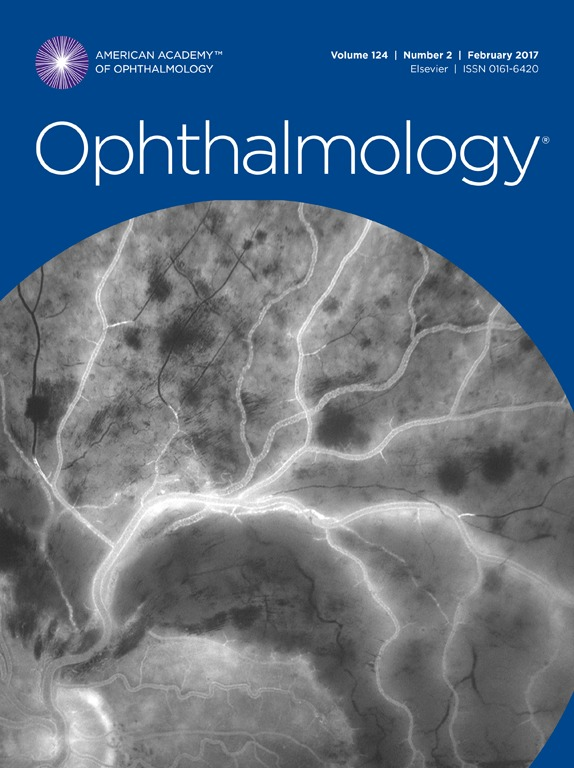The Effect of Racial, Ethnic, and Socioeconomic Differences on Visual Impairment before Cataract Surgery
IF 13.1
1区 医学
Q1 OPHTHALMOLOGY
引用次数: 0
Abstract
Purpose
To compare the associations of race, ethnicity, and socioeconomic status (SES) with visual impairment (VI) before surgical removal of cataracts across 2 health systems in the United States Mid-Atlantic region.
Design
Multi-institutional cross-sectional study.
Participants
Patients ≥ 65 years of age who underwent cataract surgery at Johns Hopkins Hospital (JHH) and Kaiser Permanente (KP) between January 1, 2017, and December 31, 2019.
Methods
Covariates included patient age, sex, smoking status, surgery laterality, Charlson comorbidity index, and ocular comorbidities. Multivariable generalized estimating equation models were used to examine the association of race, ethnicity, and area deprivation index (ADI) with visual acuity.
Main Outcome Measures
Visual acuity before cataract surgery was assessed using logarithm of minimum angle of resolution values. Race, ethnicity, and ADI were the main exposures of interest.
Results
At JHH, 11 509 patients (17 731 eyes) were included, whereas KP included 7143 patients (10 542 eyes). After adjusting for covariates, Black patients (β = 0.49), Asian patients (β = 0.83), and Hispanic patients (β = 0.95) were more likely to have worse visual acuity at JHH (P < 0.001 for all) compared with White patients. Similarly, at KP, Black patients (β = 0.56), Asian patients (β = 0.70), and Hispanic patients (β = 0.89) were more likely to have worse visual acuity (P < 0.001 for all) compared with White patients. Compared with those living in the least disadvantaged neighborhoods at JHH, higher ADI quartiles (more deprived) were more likely to have worse visual acuity (β = 0.27 [P < 0.001] for quartile 2; β = 0.40 [P = 0.001] for quartile 3; β = 0.95 [P < 0.001] for quartile 4). No significant association was found between ADI and VI at KP.
Conclusions
Among older adults, non-White race or ethnicity was associated independently with VI secondary to cataracts in 2 large health systems in the United States Mid-Atlantic region, after adjustment for ADI. Area deprivation also was associated with VI but only in the JHH system. Our study suggests that non-White patients and those with lower SES are at greater risk of VI secondary to cataracts possibly because of social, structural, and institutional barriers.
Financial Disclosure(s)
Proprietary or commercial disclosure may be found in the Footnotes and Disclosures at the end of this article.
种族/族裔和社会经济差异对白内障手术前视力损伤的影响。
目的:比较美国大西洋中部地区两个大型医疗系统中种族/民族和社会经济地位(SES)与白内障手术切除前视力损伤(VI)的关系:设计:多机构横断面数据研究:2017年1月1日至2019年12月31日期间在约翰霍普金斯医院(JHH)和凯撒医疗集团(KP)接受白内障手术的65岁及以上患者:协变量包括患者年龄、性别、吸烟状况、手术侧位、Charlson合并症指数(CCI)和眼部合并症。采用多变量广义估计方程模型研究种族/民族和地区贫困指数(ADI)与视力的关系:白内障手术前的视力使用最小分辨角度对数(logMAR)进行评估。种族/民族和 ADI 是主要的研究对象:JHH共纳入11509名患者(17731只眼),而KP共纳入7143名患者(10542只眼)。调整协变量后,与白人患者相比,黑人患者(β,0.49)、亚裔患者(β,0.83)和西班牙裔患者(β,0.95)在 JHH 更有可能因白内障而导致视力下降(P < 0.001)。同样,与白人患者相比,黑人患者(β,0.56)、亚裔患者(β,0.70)和西班牙裔患者(β,0.89)的视力更差(P < 0.001)。与居住在 JHH 最贫困社区(ADI 四分位数 [Q] 1)的患者相比,ADI 四分位数越高(越贫困)的患者视力越差(β,0.27;Q2,P = 0.001;β,0.40;Q3,P = 0.001;β,0.95;Q4,P < 0.001)。在 KP 发现,ADI 与继发于白内障的 VI 之间没有明显关联:结论:在美国大西洋中部地区的两个大型医疗系统中,在调整 ADI 后,老年人中的非白人种族/族裔与继发性白内障 VI 有独立关联。地区贫困也与白内障相关,但仅限于 JHH 系统。我们的研究表明,非白人患者和社会经济地位较低的患者因白内障而继发视力丧失的风险更大,这可能是由于社会、结构和体制障碍造成的。
本文章由计算机程序翻译,如有差异,请以英文原文为准。
求助全文
约1分钟内获得全文
求助全文
来源期刊

Ophthalmology
医学-眼科学
CiteScore
22.30
自引率
3.60%
发文量
412
审稿时长
18 days
期刊介绍:
The journal Ophthalmology, from the American Academy of Ophthalmology, contributes to society by publishing research in clinical and basic science related to vision.It upholds excellence through unbiased peer-review, fostering innovation, promoting discovery, and encouraging lifelong learning.
 求助内容:
求助内容: 应助结果提醒方式:
应助结果提醒方式:


